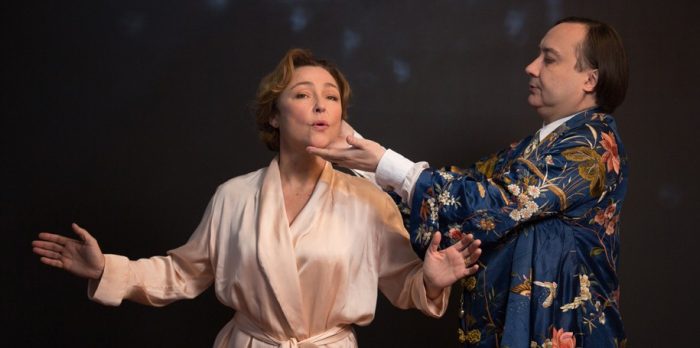Xavier Giannoli’s latest film, Marguerite, is an ever endearing and often hilarious tragicomedy that explores any artist’s worst fear – the fear that one is not truly talented, but rather laughed at and pitied behind one’s back. Set in 1920s France, Marguerite details the tragicomic downfall of wealthy baroness Marguerite Dumont (Catherine Frot), who aspires to be an opera singer despite being tone deaf. She holds regular concerts for her friends, while they ridicule her behind her back, mock her husband (André Marcon) to his face and take her money. It is an enjoyable film with a strong start. However, it is far too long and capitulates with inadequate evolution of both its characters and themes.
The film opens with one of Marguerite’s charity concerts. There are panning shots of her opulent home with its frescoed walls, manicured gardens and pet peacocks. Strangely, we are also confronted with a giant blue eyeball lolling on her front lawn. Later, we learn that Marguerite buys used stage props for taking ridiculous portraits of herself, but at this early point in the film, the giant eyeball foreshadows the film’s recurring idea – the theme of the untalented artist as an object of display. Throughout the entire film, Marguerite is under the delusion that she is producing wonderful music, where in fact her whole life is a lie. It’s like The Truman Show, except the people profiting off the pathos of Marguerite’s existence are artists instead of television producers. Frot expertly acts the deluded ingenue as tragicomic muse; she has excellent comic timing and her performance is complemented by some perfect tongue-in-cheek shots (the shot of the sole peacock feather jerking in time with Marguerite’s song had me laughing out loud). Indeed, the funniest scene takes place when Kyrill (Aubert Fenoy) appropriates Marguerite into his Dada performance art: dressed as a farm girl, she butchers the French national anthem while videos of soldiers dying at war are projected onto her smock. Ironically, Marguerite perfectly captures the spirit of Dadaism – her horrisonant tones unwittingly calling into question the role of the artist in society and the purpose of art.
This nascent concept of Marguerite as a personification of the Dada spirit fascinated me, and I was excited to watch it develop. Unfortunately, it is never readdressed and I found the second half of the film sorely disappointing. For some reason, Marguerite never realises that people are using her, even after her husband points out that Kyrill used her as part of a renegade piece of performance art for a movement that criticises the very bourgeoisie that constitutes her sole (long-suffering) audience. The only explanation the film offers is that Marguerite is incredibly lonely. She longs for the attention of her husband who spends his whole time spending her money, brushing her off, or cheating on her. Watching this sort of heart-breaking situation pan out for 128 minutes was too much for me. I always found Meet the Parents a difficult film to watch, because the plot revolves around a well-meaning but naïve protagonist being physically abused by a series of booby traps. Marguerite was a similar experience. The audience is offered no reprieve, no breath of hope. The only revelation Marguerite has relates to the comings and goings of her husband, and even then her response is to offer to give up her greatest dream to go on an express holiday with him. All the while, the exploitation of Marguerite is accentuated with casual shots of hunted animals: first, a close up of a raw chicken in the kitchen, later, a deer having its neck slit.
Marguerite also has a puzzling subplot involving music critic Lucien Beaumont (Sylvain Dieuaide) and talented opera singer Hazel (Christa Théret). I couldn’t quite work out whether these two were in love or not; they were acting like awkward ex-lovers without actually having had any substantial conversational exchanges. It seemed that Hazel’s only purpose as a character was to offer some sort of juxtaposition with Marguerite; and yet, this presupposes that a viewer might be so undiscerning about opera singing that without the contrast of Hazel’s dulcet tones we might actually think Marguerite’s singing good. Compared with Marguerite’s eccentric music teacher (played wonderfully by Michel Fau) and his motley circus of assistants, Lucien and Hazel come across as downright boring.
Marguerite is not a bad film, and I recommend it. It is funny and fresh and Frot is so charismatic that her performance almost renders the film’s dearth of substance forgivable. Its start is strong and it sets up such interesting ideas about art and reality vs. delusion that I felt sorely shortchanged when its ending failed to deliver. Indeed, after two hours, the plot seemed to work itself into a corner. As the film escalates, the audience is required to suspend increasingly flagrant levels of disbelief and its conclusion reeks of the filmic equivalent of a “and then I woke up” ending for a short story.

